#Curiosity Mars rover
Explore tagged Tumblr posts
Text
Qualifying Poll - Round 2
They were narrowed down from over 100 candidates to make it to this stage but which TWO will make it to the tournament?
#curiosity mars rover#fembots#wubbox#hatsune miku#frank#Frank tumblr#austin powers#NASA#my singing monsters#qualifying poll#tumblr poll#polls#poll#tumblr polls
182 notes
·
View notes
Photo



After 11 years on Mars, Curiosity continues to climb the slopes of Mount Sharp - NASASpaceFlight.com
13 notes
·
View notes
Text
Rafael Navarro-Gonzalez (1959-2021): The Mexican Astrobiologist Who Shaped Our Understanding of The Planet Mars
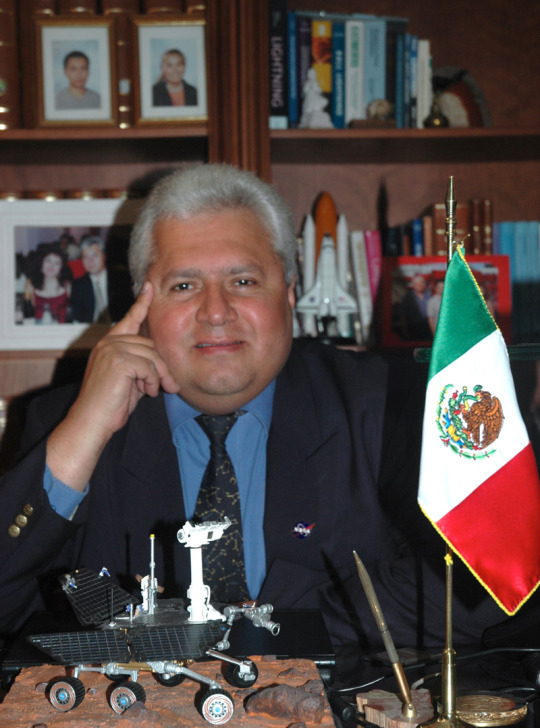
Rafael Navarro-Gonzalez was a talented and internationally recognized chemist and astrobiologist who worked at NASA. Navarro-Gonzalez is known for his work with other researchers to study the planet Mars. He made fundamental contributions to several fields related to Astrobiology, the origin of life, and life in extreme environments. Among his many accomplishments, he helped lead the team that identified ancient organic compounds on Mars. He was a Co-I on the SAM instrument onboard NASA’s Mars Science Laboratory and on the HABIT instrument onboard ESA’s ExoMars mission. He was also on the Curiosity Mars rover team. His research blended laboratory simulations, fieldwork, and theoretical modeling in transdisciplines in chemistry, physics, and biology. This sort of dominance is unusual and requires a dynamic and intellectual curiosity beyond normal boundaries. He identified the role of volcanic lightning in the origin of life on Earth. He has established one of the very best laboratories in Latin-America.
He has published 137 papers, 4 edited books and over 225 abstracts. Among the most significant contributions are those that deal the detection of organics in Mars-like environments from cold (Antarctica), temperate (Atacama) and hot (Mojave and Libya) deserts on Earth.
Navarro-Gonzalez was born in Mexico City on April 25, 1959. He earned a bachelor’s in biology from the National Autonomous University of Mexico (UNAM) where he became full professor in 2002, and a PhD in Chemistry from the University of Maryland at College Park. Dr. Navarro-González established the Laboratory of Plasma Chemistry and Planetary Studies of the Institute of Nuclear Science at UNAM.
Rafael Navarro-Gonzalez was the first recipient of the Molina fellowship award. This prize recognizes outstanding scientific achievement. He was also the recipient of the 2009 Alexander von Humboldt Medal and the World Academy of Sciences Award in Earth Sciences.
He died on Jan. 28, 2021 due to Covid-19-related complications.
In honor of his service, NASA named a mountain on Mars after him. The mountain stretches 450 feet (120 meters) tall, “Rafael Navarro Mountain” is located on Mount Sharp in northwest Gale Crater.

Rafael Navarro Mountain
“Rafael was a good friend and dedicated scientist, and it has been a privilege and honor for our Mars exploration team to work with him over the years" said the principal investigator of Curiosity’s SAM experiment.
“We are truly honored to have a prominent hill named after our dad; it’s his and our dream come true to see this happen,” wrote Navarro-González’s children, Rafael and Karina Navarro Aceves, in a statement to NASA.
“Our dad was an accomplished scientist, but above all, a great human being who managed to balance work and family."
Sources: (x) (x) (x) (x) (x) (x)
#🇲🇽#STEM#Rafael Navarro-Gonzalez#mexican scientists#astronomy#mars#NASA#Mars Science Laboratory#SAM instrument#HABIT instrument#ESA#ExoMars mission#Curiosity mars rover#latin america#volcano#meteorology#antartica#atacama#mojave desert#libya desert#UNAM#National Autonomous University of Mexico#Laboratory of Plasma Chemistry and Planetary Studies#Institute of Nuclear Science#Molina fellowship award#2009 Alexander von Humboldt Medal#World Academy of Sciences Award#covid-19#coronavirus#Rafael Navarro Mountain
5 notes
·
View notes
Text

NASA’s Curiosity Mars rover captured these "sun rays" shining through clouds at sunset on Feb. 2, 2023, the 3,730th Martian day, or sol, of the mission. It was the first time that sun rays, also known as crepuscular rays, have been viewed so clearly on Mars. Crepuscular is taken from the Latin word for “twilight,” as these rays appear near sunset or sunrise. https://mars.nasa.gov/resources/27337/curiosity-views-first-martian-sun-rays/
#nasa#mars#curiosity#sun rays#NASA’s Curiosity Mars rover#Curiosity Mars rover#Mars rover#crepuscular rays#universe#astronomy#nature#god's creation#godscreation
1 note
·
View note
Text

Ask and you shall receive.
So do y'all know about Curiosity's wheels? They have these cool hole patterns!
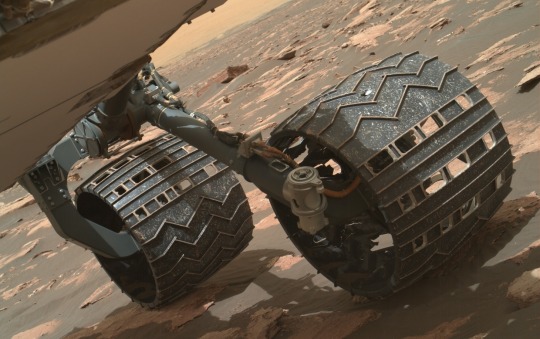
The holes are ostensibly for tracking wheel slippage. The pattern is stamped in the Martian sand, and by taking a picture of the tracks and measuring the distance between the repeating hole marks, you can tell how much the wheels are slipping.
But the pattern isn't arbitrary! Curiosity (along with many many other NASA missions) was built by the Jet Propulsion Laboratory - or "JPL". While JPL is entirely federally funded and almost exclusively works on NASA missions, it's technically operated by Caltech, not NASA. When JPL was assembling Curiosity, they added some "JPL" decals to it along with the cool "Curiosity" label on the arm.
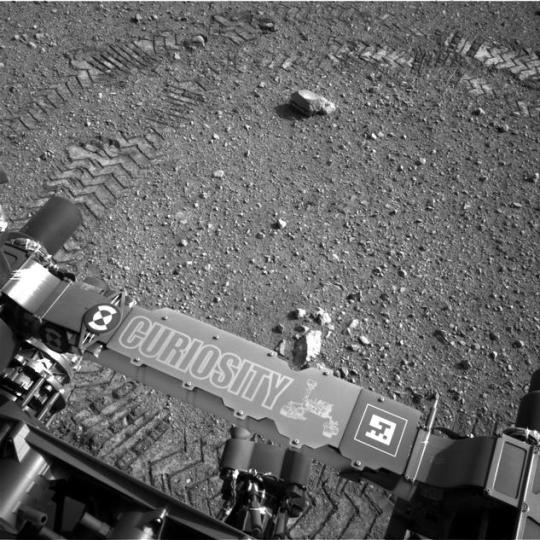
Well, NASA HQ found out and got mad. "You can't put those JPL stickers all over our rover!" they said, and made JPL scrape them all off.
JPL reluctantly complied, but definitely got the last laugh. No decals allowed? Well fine - the holes in Curiosity's wheels say "JPL" in Morse code. So every few feet, the name of the real creator of the rover is stamped into the surface of Mars!
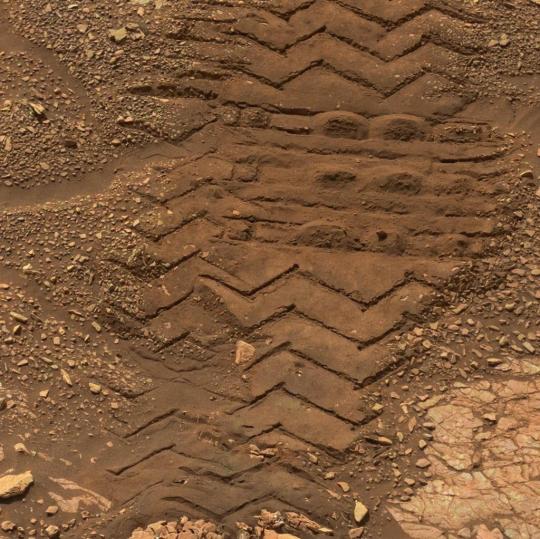
1K notes
·
View notes
Text
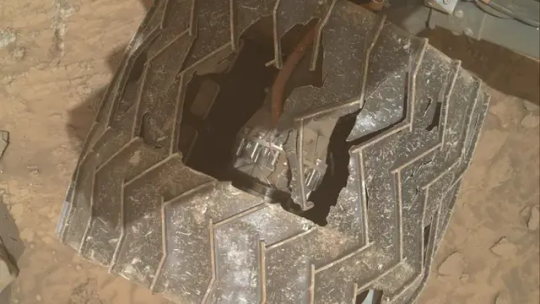
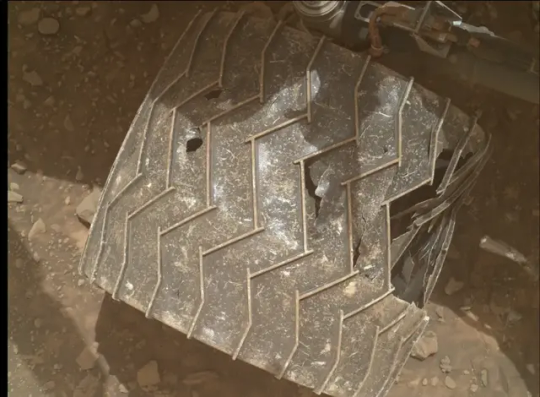
New NASA images reveal giant hole in Curiosity rover's wheel after 12 years of 'abuse' on Mars
Images captured by Curiosity's onboard cameras show several large tears in the tire of one of the rover's wheels. However, the damage does not appear to be slowing the roaming robot down.
Curiosity first touched down on Mars on Aug. 5, 2012 and was initially only expected to last for two years. But the hardy rover has defied expectations and has lasted 4,323 Martian days, or Sols, on the Red Planet, traveling more than 20 miles (32 kilometers) around the Gale Crater, where it originally landed.
However, new photos taken by Curiosity's Mars Hand Lens Imager (MAHLI) and released by NASA on Sept. 24 reveal that the rover's epic journey has taken a toll on the robot's middle right wheel. The images show several large tears in the wheel's heavily scratched tire, including one particularly large hole that reveals the wheel’s inner mechanisms. It is currently unclear when these holes first emerged or if any of the rover's other wheels have suffered similar damage.
The damage may look bad but Curiosity "is still holding up well despite taking some of the worst abuse from Mars," mission operations engineer Ashley Stroupe wrote in the statement.
By Harry Baker.
#giant hole in Curiosity rover's wheel#Curiosity#mars rover#mars#nasa#nasa science#nasa photos#nasa picture of the day#science#space#space travel#space science#space exploration
211 notes
·
View notes
Text
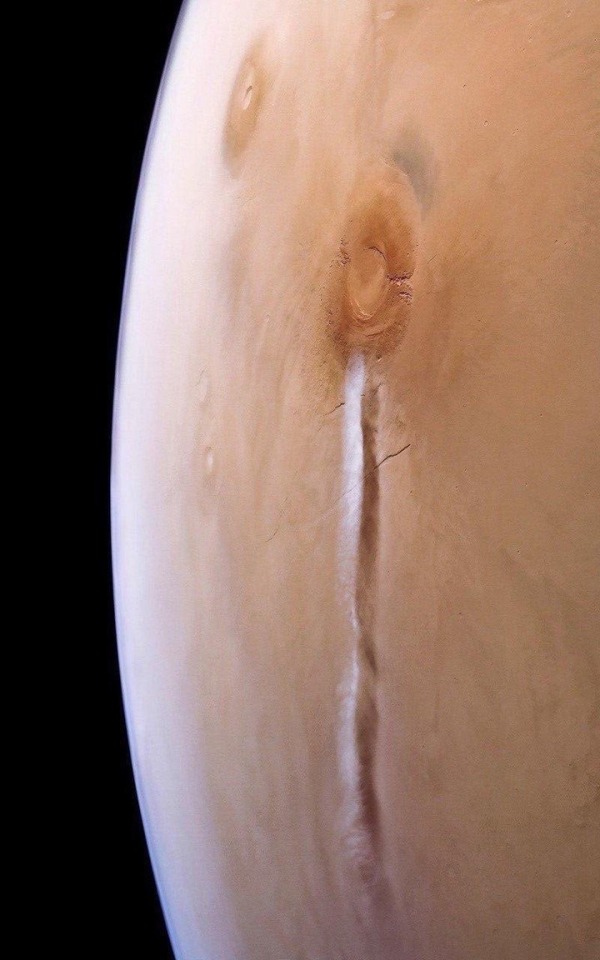
A 1500 Kilometer long lonely clouds spotted on Mars.
#mars planet#mars#planet mars#clouds#cloud photography#astronomy#nasa#astronomers#universe#nasa photos#astrophotography#astrophysics#outer space#nasawebb#hubble space telescope#space travel#space program#international space station#spaceship#telescope#curiosity rover#planets#solar system#our universe#space science#space exploration#space#nasa science#science facts#planetary science
192 notes
·
View notes
Text
Mars Planet by Curiosity Rover, 2024
350 notes
·
View notes
Text

Clearest image ever taken of Mars' North Pole. Yes that's water ice.
Fonte: X
127 notes
·
View notes
Text


Sagan Station, Mars "Terra Prime"
#Star Trek Enterprise#Enterprise#Terra Prime#Shuttlepod#Sagan Station#Mars#Carl Sagan#Curiosity Rover#Mars Rover#entedit#enterpriseedit#startrekedit#startrekdaily#tvedit#scifiedit#00sedit#ent s4#4.21#GIF#my gifs#Secret Enterprise Rewatch#Hide and Queue
97 notes
·
View notes
Text
Best Robot Tournament
Round 1 - Momo versus Curiosity Mars Rover


#momo#curiosity#momo stray#curiosity mars rover#stray#stray game#NASA#mars rover#round 1#best bot round 1#best robot tournament#robot tournament#poll#polls#tumblr poll#tumblr polls
99 notes
·
View notes
Text
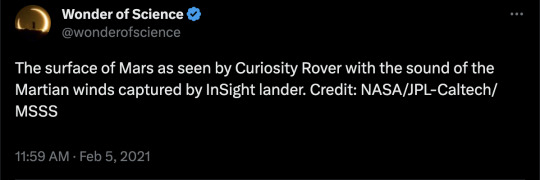
959 notes
·
View notes
Photo

This Zenith Movie was taken on Sol 1222 (2016-01-13) at approximately 9:52 LTST and a solar longitude of 94.64°. (What is this?)
337 notes
·
View notes
Text
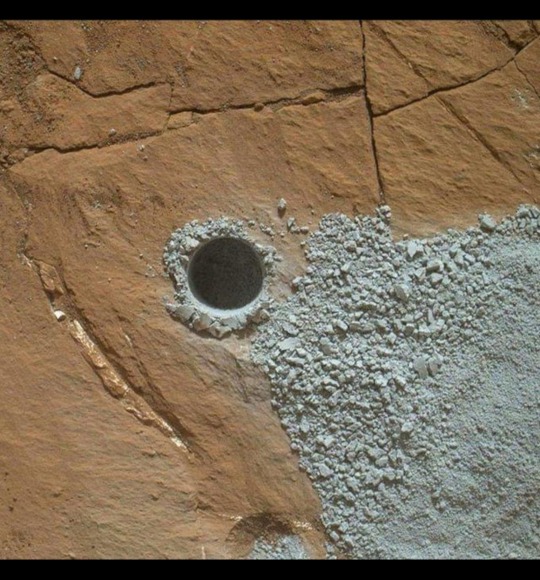
A hole drilled on Mars by Curiosity Rover, one of 36 holes drilled.
#Mars#martian#curiosity#curiosity rover#nasa#space exploration#space#outer space#science#nasa jpl#Jet Propulsion Laboratory#astronomy#perseverance rover#mars mission#Ingenuity#jezero#explore mars#space craft#2001#martian surface#phobos#deimos#mars landing
54 notes
·
View notes
Text
martian sunset by the curiosity rover

74 notes
·
View notes
Text
I don't have a logical reason for it but the quotes "Tell the emperor that my hall has fallen. Apollo no longer has his house, nor his mantic bay, nor his prophetic spring; the water has gone quite." And "My battery is low and it's getting dark" have the same energy to them. Perhaps on occasion, the machine and divine can speak the same poetry.
#196#my thougts#paganism#pagan#apollo#appollo#roman mythology#roman empire#oracle#space exploration#space travel#mars#mars rover#curiosity rover
110 notes
·
View notes